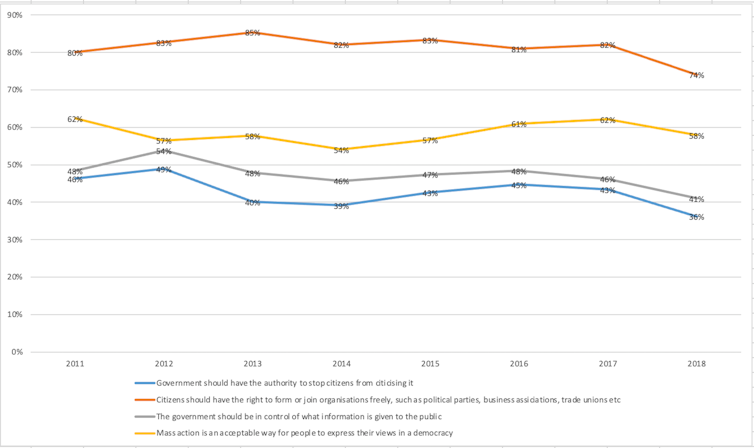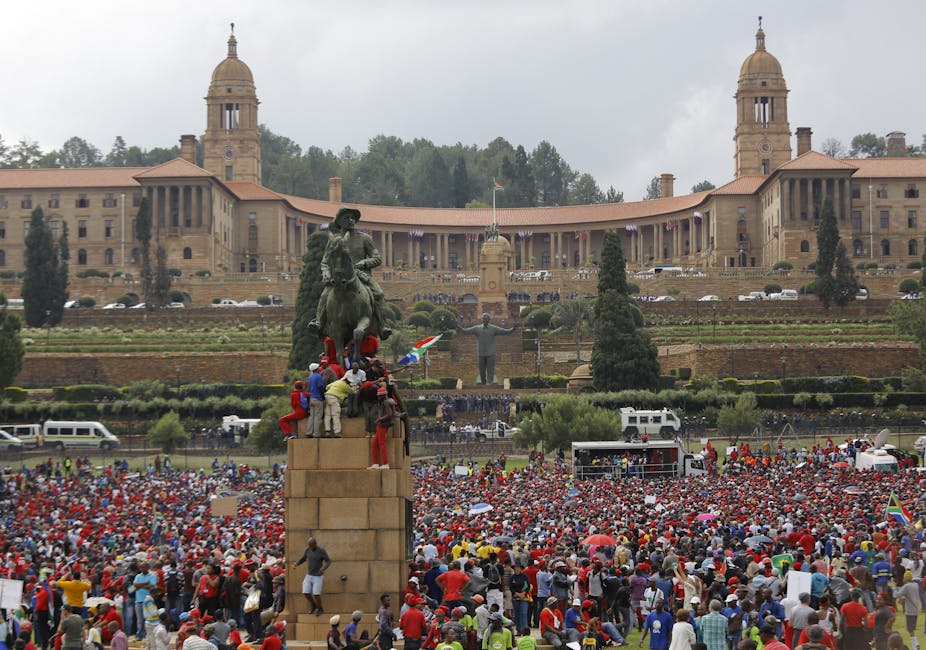How do South Africans view democracy? Are they in the camp of those who see democracy through a more authoritarian lens – in other words, where the state plays a more intrusive role? Or do they see democracy as more participatory, where citizens have a greater say?
This is an important question as the country commemorates 27 years of constitutional democracy after the historic founding election on 27 April 1994.
The celebrations come against the backdrop of a gradual decline of democracy globally. This entails, among other ills, increased restrictions on media freedom and civil society as well as harassment of opposition parties. South Africa has not been immune to these trends.
To answer the question how South Africans view democracy, I drew on the South African Social Attitudes Survey data from 2011 to 2018.
The findings show that while South Africans value some democratic principles, they also hold authoritarian views. This means that South Africans hold political values that could facilitate a further decline in the country’s democracy.
Four key criteria
To understand how South Africans view democracy I focused on four questions asked in the survey. These were whether
government should have the authority to stop citizens from criticising it;
citizens should have the right to form or join organisations such as political parties, business associations and trade unions freely;
government should be in control of what information is given to the public; and
protest is an acceptable way for people to express their views in a democracy.
These questions are important indicators of the country’s political outlook. The right to criticise government, freedom of association, access to information and the right to assemble are key principles for the durability of democracy.
Also, the apartheid state engaged in political repression and media censorship to control information. It banned political associations and people who criticised it.
The survey results showed that South Africans’ political outlook remained consistent between 2011 and 2018. It also showed that they consistently held both a democratic and an authoritarian political outlook. Thus, the country’s political culture could be constructed as holding contradictory views that might, in a context of dissatisfaction with democracy, support growing political radicalism and populism.
Most respondents believed they should have the right to freedom of association. They also believed they should be able to protest to express their views. Yet, between 36% and 49% believed that the government should have the authority to stop people criticising it.
Between 41% and 54% of people believed the state should be able to control what information was given to people.

South Africans have, seemingly, forgotten the severe impact censorship had on their struggle for freedom.
We found that there was a difference in perceptions, based on political support, on whether government should control information and stop people from criticising it. We noted that 44% and 49% of responded who supported the governing African National Congress (ANC) and Economic Freedom Front (EFF), the third largest party, respectively, supported repressive measures to stop people criticising the government.
Interestingly, 32% of supporters of the Democratic Alliance (DA), the main opposition party, also held this view. This is contradictory to the liberal values that the DA espouses.
Across all three political parties, freedom of association was held in high regard, with 78% of ANC, 70% of DA and 75% of EFF supporters showing positive attitudes to the right of people to join and form political and civic associations.
Given the support for repressive measures to stop people criticising government as well as strong support for protests and freedom of association, South Africans hold contradictory political values for an open, transparent and democratic society.
Freedom of association and protest are valued, but so too are repressive government measures and control of information. Perhaps more worrying is the view that government control of information is acceptable. Fifty percent of ANC, 33% of DA and 50% of EFF supporters agreed that government should control what information was given to the public.
This perception does not support the basic democratic value of openness and transparency. The is even more worrying given the increase in fake news, conspiracy theories and disinformation. Access to credible sources of information as the basis of a democratic society is now more important than ever.
Civic education gap
With the rise of populism in the context of the global decline in democracy, the contradictory political views of South Africans on basic democratic values point to a need for a new civic education for democratic citizenship.
This is particularly important as rising populism undermines democratic political culture. South Africa has also seen an increase in populist political rhetoric. Also on the rise are political intolerance, as shown by racial and political polarisation, as well as political disillusionment and violent and destructive protest action.
To build a political culture that supports democracy in South Africa, civic education needs to move beyond voter education. It should also focus on promoting civic citizenship and political values that support a democratic political culture.
If not, democracy may regress even more, undermining the high price paid for freedom in the country.

